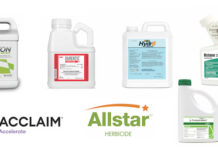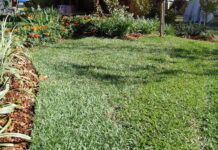It’s never too late to start thinking ahead when it comes to pest management strategies for your clients. Planning and preparing this fall and winter means you can proactively offer these services to your clients and fill your schedule with work in the spring. However, if pest management is something you haven’t included in your professional lawn care service offerings before, there are a few things you need to know and do before you can book and complete the work.

Pesticide Basics
All products that kill pests are pesticides, although, there are several categories under this umbrella that target certain types of pests. Two popular spring applications include insecticide and herbicide. According to Iowa State University Extension and Outreach, insecticides, used to kill insects, can be classified as residual or non-residual. This refers to how long the insecticide remains active after application. Herbicides, used to kill weeds, are commonly referred to as pre-emergent and post-emergent. The University of Illinois Extension states that pre-emergent herbicide kills weeds as they sprout from seeds, and post-emergent is used to control existing weeds.
Pesticides come in many different forms, including sprays, gels, dusts, and baits, but none are a single-solution treatment. “It’s important to understand your targets,” says Bob Mann, agronomist and director of state and local government relations for the National Association of Landscape Professionals (NALP). “Not only do you need to know which type of pest you’re treating, the pesticide you use can vary based on season, your geographic location, and also long-term plans for treatment.”
Any property owner can head to their local home improvement or lawn care store to purchase pesticides for use on their own property. However, the U.S. Environmental Protection Agency (EPA) states that the application of pesticides, including restricted-use pesticides (RUPs) not available to the general public, to any land that you don’t own qualifies you as a commercial applicator and this requires certification.
Commercial Pesticide Applicator Certification
The process to get licensed varies state to state. The best way to get started is to reach out to the lead agency that handles pesticide applicator certification in your state. This can be as simple as Googling “pesticide license” and including your state in the search query, or visiting the Association of American Pesticide Control Officials at aapco.org, navigating to Control Officials page, and selecting the state in which you want to get licensed.
Licenses apply to the individual, not the company, so each person who uses or supervises the use of pesticides must be licensed. The certification process generally requires studying materials, scheduling time to sit for the exam, and completing the license application, which sometimes is done in conjunction with scheduling the exam.
Your state agency can provide information on where to purchase print or online materials. If you need more structure, your local cooperative extension training program might offer a live training to prepare for the state pesticide exam.
Insurance Coverage
When applying for your pesticide applicator’s license, you will be asked for proof of insurance. Your insurance agreement must include the state’s minimum general liability coverage. However, it’s important to select an insurance agent who understands the requirement specific to pesticide applicators. The specialty coverage these agents provide is designed to thoroughly protect your business beyond general liability. It’s never a bad idea to shop around for the best price and coverage to suit the needs and budget of your business.
Getting Started
Many start off working for a company as a lawn specialist. This provides the benefits of getting licensed and gaining experience without the initial personal investment. Others start out through a franchise system. Franchisees buy into a known brand and a system that is proven to work while also benefitting from the support and accountability that comes from being part of a peer group through the franchise.

However, there are those who strike out on their own right away, whether full time or as a side gig, and the barriers to entry are fairly low. “You can enter the marketplace and support yourself without having to make a huge investment. I think it’s important for people to know that,” says Mann. “You really have an opportunity to start out and grow a business without having to be beholden to bankers or credit cards. You can head to the local supplier and buy a professional-quality fertilizer spreader or a backpack sprayer for a modest amount of money.”
Many people started by experimenting on their own lawn, and after getting licensed, started offering services in their neighborhood. “There are a lot of self-taught people who started small and grew their business in this industry,” Mann says. “Don’t be intimidated. There’s no need to be an expert when you’re getting started. You’ll layer on the knowledge and wisdom you pick up over the years to grow your business.”
Tap Into Your Resources
Managing a successful professional lawn care business doesn’t end at earning the applicator’s license and doing the work. New pests and methods of treatment are discovered regularly, so building your knowledge is essential to maintaining your business.
Mann recommends tapping into local cooperative extension training programs for the latest information specific to your local landscape needs. “Cooperative extension programs are reliable sources,” he says. “It’s science-based information that you can feel comfortable discussing with your client.”
Cooperative extensions offer a variety of trainings as well as online and print materials. Best management practices (BMPs), a relatively new addition to the industry, look at the landscape holistically to help you sustainably grow the healthiest plant possible by doing a variety of things to the landscape—including grass-cutting height, blade sharpness, and more—prior to applying fertilizers and pesticides. Due to the varied needs of different types of landscapes, BMPs cover topics such as residential, commercial, and golf turf.
Integrated pest management (IPM) is another way to approach treatment. IPM is a decision-making framework to help you manage pests in the short and long term for your clients. “Just because you have a pest in a landscape doesn’t mean you have to kill it,” says Mann. “IPM is very location-based and tries to minimize the use of pesticides by really understanding the biology where you’re working.”
Other resources include professional associations, industry trainings, conferences, and trade shows. Networking is an excellent way to expand knowledge, as well. “There’s a lot of help out there,” says Mann. “People entering the industry need to feel comfortable reaching out to others.”
Getting Ready For Spring
Spring is a popular time of year for insecticide and herbicide application, and your clients may be looking for your help to get a jump on their perfect summer lawn. Pest management is a lucrative service offering to add to your business. Make the most of the fall and winter months preparing to implement pest management strategies for your clients by getting your pesticide applicator’s license, getting the appropriate insurance coverage and studying up on the best options for your clients’ landscapes. n
Duane is a freelance writer specializing in business and marketing topics for the outdoor trades and recreation industries. Her background is in trade associations, corporate retail, and professional services. When not writing, Duane can be found running, hiking, and biking the Front Range of Colorado. She is currently based in Denver.
Do you have a comment? Share your thoughts in the Comments section below or send an e-mail to the Editor at acosgrove@groupc.com.











![[VIDEO] Dickies®: Discover Workwear That’s Anything But Uniform](https://turfmagazine.com/wp-content/uploads/2023/06/1647663814-4b1a2a7742790a9b1e97a3b963477850192e1d6a9dfba9b07214a77bae25d6e3-d-218x150.jpg)





























![[VIDEO] Dickies®: Discover Workwear That’s Anything But Uniform](https://turfmagazine.com/wp-content/uploads/2023/06/1647663814-4b1a2a7742790a9b1e97a3b963477850192e1d6a9dfba9b07214a77bae25d6e3-d-324x160.jpg)